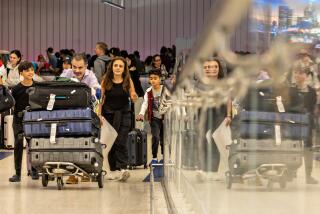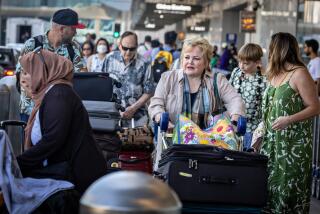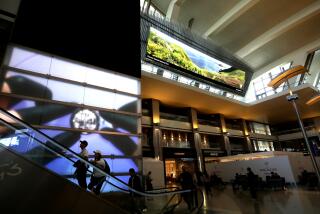Enhanced airport security may waste money, study says
Months after an airport screener was killed in a shooting rampage at Los Angeles International Airport, a new report concludes that adding more security measures at the nation’s airports may not be worth the cost.
The study goes on to suggest that it might even make sense to relax some of the existing security tactics.
“It may be time to reduce security,” said John Mueller, a professor of political science at Ohio State University who wrote the report with Mark G. Stewart, a civil engineering professor at the University of Newcastle in Australia.
Mueller and Stewart conclude that airports are not good targets for terrorists and that the odds of being killed in an airport attack are extremely long. Their study, titled “Cost-benefit analysis of airport security: Are airports too safe?,” appeared in the March edition of Journal of Air Transport Management.
The study relied on cost and risk reduction numbers for LAX but were calculated before the Nov. 1 rampage by a gunman who killed Transportation Security Administration agent Gerardo Hernandez, 39, and wounded several others. Mueller said the shooting did not change his cost analysis.
The Mueller-Stewart study looked at several potential threats, including a gunman, a suitcase bomb, a truck bomb and a bomb strapped to a person. The professors also looked at the cost and effectiveness of such security measures as adding more bomb-sniffing dogs, and installing permanent vehicle search checkpoints and shatterproof glass and blast deflection walls at the airports.
Using cost-analysis computations, the study concluded that the cost of such measures would not be justified, considering they would not completely eliminate the threat.
“Moreover, if the analysis suggests that enhancement of airport security is highly questionable, it may well be time to consider if many of the security arrangements already in place to protect airports are excessive,” the report said.
LAX police declined to discuss future airport security measures.
Jan Brueckner, a UC Irvine economics professor and airline industry expert, agreed that airports are not a priority target for terrorists “but some level of spending on security makes sense,” he said.
Although many travelers complain about airline security, Brueckner said the current level of security at airports doesn’t seem intrusive.
Airline ads may once again be allowed to feature base fare
Legislation that would let airlines advertise airfares without adding in fees and taxes has the support of — you guessed it — the nation’s airline industry.
The bill introduced March 6 by Reps. Bill Shuster (R-Pa.) and Peter DeFazio (D-Ore.) would negate a rule adopted in 2011 by the U.S. Department of Transportation that now requires airlines to advertise the full cost of tickets, including fees and taxes.
The Transportation Department has already fined the nation’s airlines thousand of dollars over the last three years for violating the “full-fare” advertising rule.
Under the new bill, dubbed the Transparent Airfares Act, airlines can advertise the base fare, with extra fees and taxes listed separately on the same print ad or with a link or pop-up window on websites.
Airlines for America, the trade group for U.S. airlines, said last week that the current federal rule is unfair because it masks how much government fees raise airfares.
“It’s a misnomer to characterize the current law as a consumer protection rule when it really protects the government, not airline passengers,” said Nicholas E. Calio, president and chief executive of the group.
Los Angeles to Saudi Arabia route coming soon
Saudi Arabian Airlines is scheduled to begin new service from Los Angeles International to Saudi Arabia this month, a type of development that in the past was celebrated with an elaborate ceremony on the tarmac and in the terminal.
For example, when Emirates Airline debuted daily service between LAX and Dubai in December, the airline taxied the A380 plane to the gate under a shower of water from the airport fire department’s water cannons.
But with California entering the worst drought in modern times, LAX officials told Saudi Arabian Airlines that they are calling off the water cannons for the celebration of the new route.
Instead, LAX firefighters and their rigs will line up on the tarmac, with the firefighters saluting as the debut flight rolls past.
More to Read
Inside the business of entertainment
The Wide Shot brings you news, analysis and insights on everything from streaming wars to production — and what it all means for the future.
You may occasionally receive promotional content from the Los Angeles Times.










